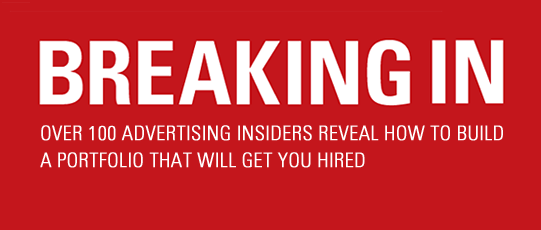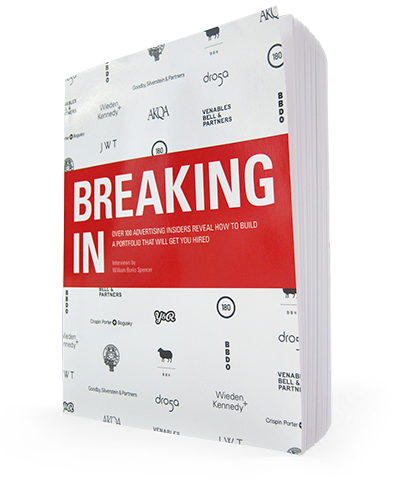Breaking In author William Spencer was recently interviewed by Christopher Cryer of Shellsuit Zombie, a UK-based organization that is all about helping young creatives. That’s what we’re all about too!
Here is the full text of the interview:
Breaking into the ad industry? This’ll be handy.
A bead of sweat runs down your hand and drips onto the front page of your portfolio (book), distorting the inked title, as your parched lips sip a post-crit beer.
It’s a hot, muggy, competitive placement season. So if it’s all getting a bit much for you, read this refreshing advice from William Burks Spencer. He’s interviewed over 100 of the world’s top Creative Directors & Creatives – specifically on what they want to see in your book. And now, I’ve interviewed him.
CC: Stuff that isn’t actual advertising. In or out?
WS: I personally like it. Not everyone does.
Ad agencies are doing more and more stuff that isn’t actual advertising so I think it’s becoming more relevant. One way to hedge it (and this is one easy way to customize your book to a CD that I think is appropriate) is to make an advertising portfolio. Then have your other things. Then you can say “by the way, I have some other stuff I do on the side”. If they want to see it they can and if they don’t it won’t hurt you. But make sure that there is an idea in what you’re doing. Or craft. Don’t show pictures of your dog.
For my student book, I just put in a few things after my ad work, but that’s what got me hired on Nike at Wieden & Kennedy in Portland. If you want to see my student book it’s at williamspencer.com/old. Click on “adcenter work” for the student book.
CC: Are tablet and online books the way forward or are forest-killing physical books still in demand?
WS: I personally don’t like when students take out a laptop, put it in front of me and click through work. I think it’s awkward and I want to “drive”. I think paper books are still good, but, of course, if you have video or audio, they can’t handle that. I think iPads can combine the best of both worlds. If you can hand a tablet to a CD and have them easily swipe through your work, that’s a great way to do it.
CC: Copywriting & art direction skills – are they still valued or is it all about the idea?
WS: It depends who you talk to. For me, I absolutely want to see craft skills. I think it’s critical. I was a junior in London after grad school and before I was hired at Wieden & Kennedy in Portland. I went to one of those “dating” nights for copywriters and art directors to meet and team up and I remember hearing people making fun of my book (not knowing that I was standing right there) because it was completely comped up (no scamps or sketches) and I have several long copy campaigns.
I realise that to some people a finished ad says “this is perfect and I’m not changing it”. I know this is a cultural difference between the ad worlds of the UK and US, but I think, for an art director, it’s a good idea to show off your craft skills with comped work. I also think it shows confidence in your ideas. Of course, you need to really believe in those ideas and have put in the work to make the execution further the idea. In short, it needs to be great. And if you meet with someone who pokes holes in your strategy, or copy, or art direction, and you decide they’re right, go change it. Put in the work and comp it up again. That’s more impressive to me than going in with a scamp because you expect to have to change it when someone tells you it’s wrong. But this is just my personal opinion and I know it’s coming from an American school of thought. Most of the London and European CDs in ‘Breaking In’ would beg to differ on this one.
CC: Did the cultural shift of working in a foreign land so early on in your career help you grow creatively?
WS: Yes, but more for the cultural experiences than the time spent working on briefs. I think it’s important to see new things. It’s important to be a keen observer of people. I think travel is one shortcut to noticing more of what’s around you.
As far as working abroad, I would definitely consider it as an option. London is a very competitive place for juniors, you certainly could look at other places to find placements or internships. I heard about a junior team that traveled around the world working at agencies and blogging about it. They made a name for themselves doing it and must have had an amazing adventure too. Work visas can be tricky but, if you can make it work, I would recommend it. Not necessarily because it will make you better at advertising, but because it will broaden your thinking and make you a more interesting person.
One last thing I want to mention. An art director friend who I went to ad school with had a pretty unique book. And this gets into another way to think about your book: have a message. Think of it like a campaign. What is the thing you want to leave in the mind of a CD when they think of you? My friend was an insanely hard-working, detail-oriented art director who would not stop working until it was right. His book was a big roll of paper. You had to put it on the floor and unroll it. It was 6 feet wide once you got it flat. On the paper was one single campaign of three print ads, art directed in 7 or 8 different ways. There was a visual impact of seeing that all at once and some theatre in unrolling it. The whole thing was different and it made a point.
William Burks Spencer is author of Breaking In: Over 100 Advertising Insiders Reveal How to Build a Portfolio That Will Get You Hired.
He is also a copywriter with over 12 years of experience in advertising. He has worked at agencies including Wieden+Kennedy Portland, London and Shanghai, Crispin Porter+Bogusky Boulder & Miami, BBDO New York, AMV London, Mother London, BBH New York, JWT New York and London, Leo Burnett Chicago, La Comunidad Miami, Y&R New York, TBWA New York and others on brands such as Nike, Google, Chrysler, Target, Nokia, Starbucks, and Virgin. William has also taught advertising at Miami Ad School in London and Pratt Institute in New York and given talks on advertising at Princeton University, Columbia Business School, and Miami Ad School in Hamburg. He has degrees from Princeton University and VCU Brandcenter.
# # # # #
Thanks for the interview, Chris. Check out other good stuff at shellsuitzombie.co.uk.



Comments are closed.